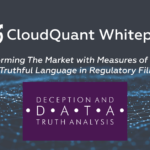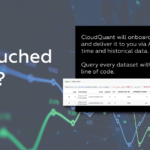About half of US allocators are planning on increasing their investments in hedge funds for 2022 according to a recent With Intelligence survey of 200 allocators. One reason may be investor concerns about the 40-year inflation rate the US is experiencing. Although last year was a good year for funds historically the Credit Suisse Equity Market Neutral Index that evaluates the Alpha generation of hedge funds stands at 0% over the past 17 years since it began in 2004.
At CloudQuant, we are creating accurate predictive analytics and signals for portfolio allocation, over or underperformance of industries within a sector, and forecasts or nowcasts of government economic factors 3-4 weeks in advance of release. These novel consumer survey datasets are powering new analytic signals to generate alpha.
Investors need to be looking at consumer survey data.
Consumer privacy advocates have notched a long series of wins in the war to establish stricter global privacy regulations. The European Union’s 2018 GDPR was a shot across the bow of data-hungry tech companies and consumer businesses that rely on digital footprints to target ads and drive revenue growth. A recent EU court ruling restricted big tech companies from transferring personal European consumer data to inexpensive American data centers for analysis and ad serving. The European court feared that unwitting European consumers could have their private business caught up in the US government surveillance dragnet set up and expanded since 9/11. If you believe it is going to be easy to get your hands on consumer digital breadcrumbs in the future, think again. Look at the recent SEC AppAnnie fine for violating the permitted use and format of the user privacy data. The days of digital data free for all that has powered the ad-tech engine for decades are coming to an end. The big tech players are aware that privacy advocates and lawmakers are the new sheriffs in town and they are about to get wrangled. Tech and consumer-oriented companies should expect a global consensus to form around basic personal data human rights which will make precise and actionable consumer behaviors harder to track and more expensive to collect. These shifting sands in the digital tracking ecosystem are why we foresee consumer survey data as the only predictable method of collecting and curating scientifically consistent consumer trend insights. Consumer survey data harnesses private consumer data from willing contributors and enables direct inquiry about questions that matter to businesses, economists and investors. If you want to know what Millennials in Atlanta, GA in the 50k to 100k income bracket are going to spend on travel in the next six months, you can ask them directly, as Prosper does, what their plans are for the future; or you can attempt to infer that from transaction data or digital engagement after the fact.
What’s so unique about this research?
When we begin analyzing a survey dataset like Prosper, we first look at the sampling methodology, the geographic coverage, and the demographic balance of the data collection process. Prosper goes to great pains to mimic the demographic make-up of the US and Chinese markets. In addition, they have curated a history of data going back over 20 years for the US. In addition to providing well-designed segmentation of the participants based on key demographic features, we liked the fact that many of the questions were phrased to elicit forward-looking perceptions and expectations.
We utilized our machine learning research approach to delineate the key predictive features hidden within the data from 2015 to mid-2021. Within that time period, we identified particular questions and responses that were predictive of over or underperformance of particular sub-industries within a sector. With that predictive model, our research team was able to select a portfolio of subindustries that were predicted based on the Prosper survey results to outperform the broader market.
We have also presented results in a recent JP Morgan Institutional Investor conference showing the use of the same dataset to forecast or nowcast government economic numbers 3-4 weeks in advance of their actual release.
CloudQuant recommendations for incorporating survey data into your investment strategy
We view this type of survey data as being adaptive to market regimes and able to peek into the future to gain a slight advantage over transactional or engagement-based datasets. We recommend utilizing the data to identify which segments of the stock market are likely to be a target-rich environment with strong revenue and earnings momentum. Ultimately this data is getting at “how confident are you?” and “where do you plan to spend your money in the near future?” of the US and Chinese consumers. Our research shows that regardless of whether you are investing in traditional growth or value subindustries, the data and signals developed from the dataset were deterministic in their ability to forecast over or underperformance of the market. This dataset definitely gives you the ability to skate to where the puck is going to be rather than looking at where it was and trying to predict the next move.
What stands out about Prosper data?
We were impressed by the versatility of this dataset. Investors are also acutely aware that due to GDPR (EU), CCPA (California), PIPL(China), and other data privacy regulations, many digital sources of online consumer trend data are going to be cut off, or severely limited in terms of custody, transmission, and application. The ability of a technology company to utilize consumer data for a purpose not specifically authorized is frequently verboten and regulators are now enforcing this. In some cases, those sources will be outright eliminated. Privacy advocates are increasingly ensuring that your engagement, clicks, and transactions are your own property. That makes it incredibly difficult to use the data for prediction. As a data scientist and institutional investment research team, we are looking for a long history backed by a scientific process that is consistent and likely to be around in the long run so that we can generate a long-term edge for investors. The ability to utilize this dataset to forecast revenue, earnings growth, brand momentum, economic activity, consumer confidence, unemployment, inflation, and other key investment factors makes it a core dataset for any serious market or investment analyst.
“Clients Are Actively Using This Data to Navigate the Markets”
Institutional investors seem to have rediscovered this Prosper data as the allure of digital trend data has dimmed. I attribute that to two factors: (1) the regulatory environment for data privacy is trending strongly in the direction of restrictions preventing that data from being used in ways it has been previously unless specifically permissions and (2) backward-looking transaction data as it turns out simply isn’t as useful for prediction of the future. This can be seen in the investment returns we measured in the investment processes we developed utilizing the Prosper data.
The Proprietary Nature of the Prosper Signal
The breadth of questions covered by this survey can set any research analyst onto a dozen different investment theses. It does an excellent job of capturing the current state and future outlook of the economy, the job market, investment returns, consumer products, government, travel plans, savings plans, spending plans, eating out, major purchases, consumer discretionary spending, family and even your love life. Having a long history of consistent measurements of these features is nearly impossible to find. With monthly US data going back over twenty years, and quarterly Chinese data going back over ten years, there is coverage of enough economic shocks to show this is an all-weather dataset. Its ability to detect and forecast trends throughout the pandemic powered impressive investment performance over the last few years.
Datasets to look at in conjunction with Prosper Consumer Survey Data
- Crowdsourced Earnings Estimates
- Institutional Flow
- Retail Flow
- Purchasing Intent
- Earnings Distortion
- Earnings Quality
- Social Sentiment
- Earnings Call and Filing Sentiment
Dataset Performance Throughout the Pandemic
As I alluded to earlier, Prosper’s data completely nailed it during COVID and essentially gave our investment model an early preview of the future to make superior investment decisions. It has definitely stood the test of time and circumstance for us. One investment strategy developed by CloudQuant outperformed the market by 23% during the last 24 months throughout COVID-19. What’s more, is that the strategy did so by identifying some subindustries that should be sold short and some that should be bought.
What types of investors would find the most value in this data?
Fundamental Investors, Quantamental Investors, Global Macro Investors



